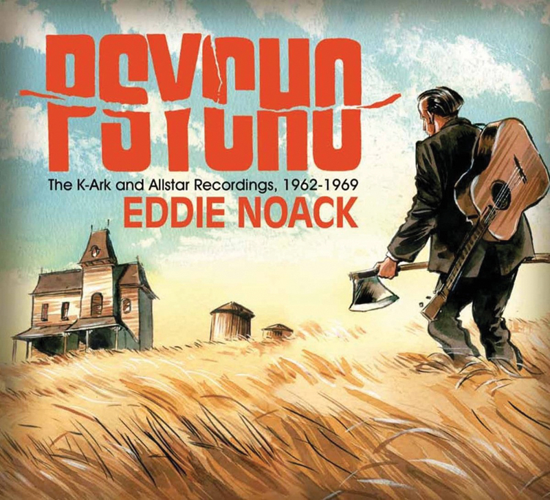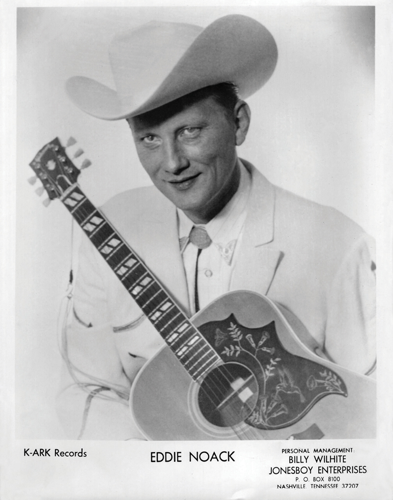Traditional country music has seldom shied away from songs of murder and mayhem. But even in a field that produced such classics as the Louvin Brothers' "Knoxville Girl," Porter Wagoner's "Cold Hard Facts of Life" and Johnny Paycheck's "(Pardon Me) I've Got Someone to Kill," it's hard to top the twisted trilogy of singles recorded in the late 1960s by Texas songwriter and singer Eddie Noack. It's a terrorizing trio that's spotlighted on the recently released collection from Bear Family Records, Psycho: The K-Ark and Allstar Recordings, 1962-1969.
Beginning his career in the late 1940s, Noack became a successful songwriter, penning several hits for Hank Snow, Ernest Tubb, George Jones and others. By the spring of 1968, however, Noack was on hard times with very few prospects. He ended up at the tiny K-Ark Records, whose bread-and-butter was vanity pressings for aspiring country singers and "song poems." Also known as "song sharking," it was a practice where would-be songwriters paid to have their lyrics "professionally recorded by top studio musicians" under the misguided belief it was a fast track to success.
K-Ark head Johnny Capps employed musicians like Noack to produce vanity and song-poem sessions, along with the occasional legit release on the off chance they might score a hit. In the spring of 1968, Noack recorded four cringe-inducing stinkers for K-Ark's song-poem operation and used the remainder of the session to cut his truly fine self-penned, prison-themed honky-tonker "Invisible Stripes" and the utterly bizarre, jaw-dropping serial killer ballad "Psycho."
"Psycho" came from the mind of songwriter Leon Payne ("I Love You Because" and "Lost Highway"), who most likely pitched the song to Noack shortly before the session. The irony-free saga of murder, mayhem and madness shot the traditional country murder ballad into the very dark hills of La-La Land. While "Psycho" failed to find a home on the country radio playlists of the time, decades later it became an underground hit among country punks who skew toward the darker side of hillbilly music.
Cult status was in the distant future when Noack re-entered K-Ark's studio a few months later to cut his self-written contribution to the serial-killer hillbilly hit parade. In many ways, "Dolores" is stranger and more bizarre than "Psycho." Noack calmly relates the facts of the case — "a man who sees a girl and goes berserk," warning his wife, the eponymous "Dolores," to stay off the streets at night. As you might suspect, no good comes of this situation, with a sadistic added twist in the final verse.
In the fall of 1969, Noack recorded his last single for K-Ark, the noir-tinged ballad "Barbara Joy."
Written by Noack, the song was recorded by George Jones in June of the previous year and released on Jones' 1969 LP Where Grass Won't Grow. In Jones' hands, the song is a desperate plea for mercy addressed to a heartless woman. But Noack's deadpan delivery pushes what appears to be a straight-up portrait of a romantic tryst and betrayal into the shaky ground of the "unreliable narrator." Is the narrator truly a victim, or yet another killer who views the world through his own demented filter?
Unfortunately, Noack's life reflected his art as he continued to struggle with self-destructive demons. They eventually led to his death from an alcohol-related cerebral hemorrhage in 1978 at age 47. His recordings for K-Ark are some of his most obscure records, with only a few hundred copies pressed on their initial release. With the new Bear Family collection, they can now be savored in all their ghoulish glory.
Email music@nashvillescene.com.






